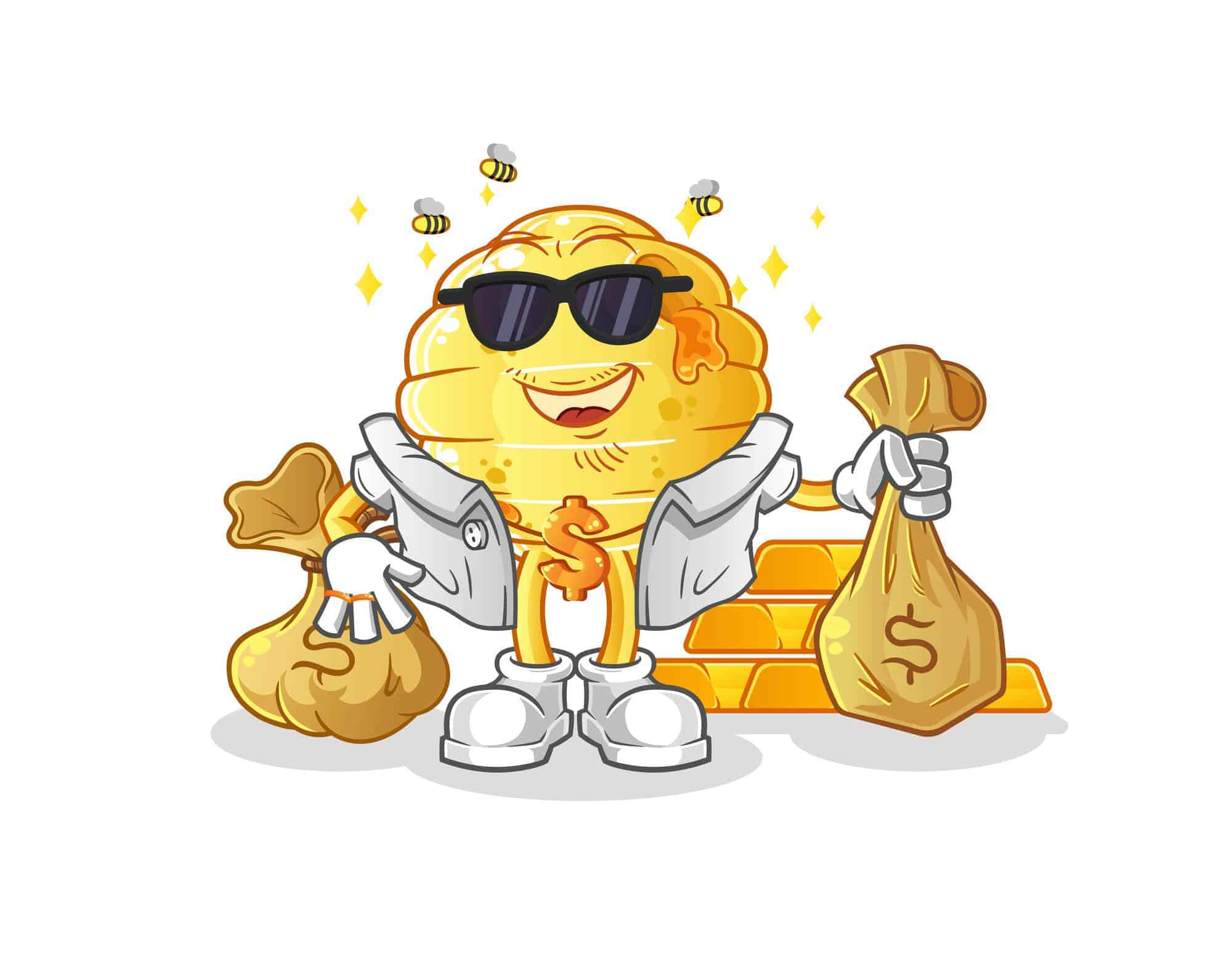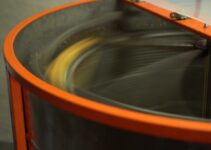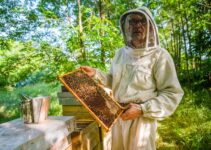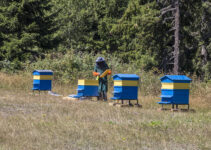Probably one of the most common reasons why people enter the field of beekeeping is so that they can earn some profit regardless of whether they are full-time beekeepers or are doing it as a job on the side. And one of the things that make beekeeping profitable is their honey. Then again, is that enough to make beekeeping profitable? Is beekeeping even a profitable endeavor?
Beekeeping is actually profitable because you are going to make up for the costs of your initial investments. However, the profits that you can earn from beekeeping depend almost entirely on how many beehives you have. So, if you don’t have enough beehives, you might not make a lot of profit out of beekeeping.
The thing you need to understand about beekeeping is that the profits you will be making will depend largely on one chief factor, which is the number of hives you are keeping. After all, the more hives there are, the more honey and other products you will be able to sell. But, for you to understand more about how to make a profit out of beekeeping, let’s dive into this field a bit deeper.
Is it profitable to raise honey bees?
Honey bee farming or, simply put, beekeeping has become quite popular among different people all over the country nowadays, primarily because there are plenty of different benefits that people get out of it. Of course, these people enter the field of honey bee raising for their own unique reasons. But one of the most common reasons why people take care of honey bees is that they do so for profit.
In that regard, because many people do indeed enter the field of beekeeping because they want to earn money out of it, is it safe to say that it is a profitable endeavor or business to raise honey bees? Will you actually make money from beekeeping?
For starters, yes, beekeeping can be a profitable business even if you are doing it on the side and not as a full-time job. But, before we get into the details, let us first try to define what it means to be profitable.
According to the Merriam-Webster dictionary, “profitable” means “affording profits: yielding advantageous returns or results”. In that sense, for something to be profitable, it has to result in something that is advantageous on your part or must provide you with financial gain, which is what the word “profit” really means. And when we say financial gain, this usually comes in the form of the positive difference between the amount earned and the amount spent.
So, basically, if we were to say that beekeeping is a profitable field, we have to be able to show that you will be able to earn profits in the sense that the amount you gain out of it is more than the amount you spent to enter such a field. In short, it must result in something that gives you advantageous returns.
That said, when you look at beekeeping and whether or not it is profitable, you have to look at the initial cost of entering the beekeeping industry or the initial investments (we will go into that later) and the upkeep costs. And, after that, you have to look at the differences between your initial investments + upkeep costs and the amount you can make out of selling whatever it is you can sell when you are in the beekeeping business. This is where you can see your profits.
So, in relation to that, let us first look at the many things that you can sell or make money from when you are in the business of beekeeping:
Honey
Probably the most saleable part of beekeeping is the honey you get from taking care of your honey bees. And this is probably the most popular reason why people enter the field of beekeeping as they have a choice to keep the honey for themselves or to sell it to make some money out of it.
Honey is also the most popular product that is produced by honey bees. These honey bees naturally produce honey on a regular basis because of how important it is for the survival and the growth of the entire colony. What bees do is simple; the worker bees come out during the day to forage for nectar and pollen from nearby flowering plants. They would then suck out nectar and bring it back to their hive, where the nectar and the pollen will be further processed by the other worker bees so that it can turn into honey.
The reason why honey is important to the survival of the colony is that they use it as one of their food sources on top of the nectar and pollen that they consume. Honey is also the food that they eat so that they can produce beeswax, which is what they use to produce the honeycombs in the hive.
Drawing out comb is an important part of a bee’s daily activities as they store honey and larvae in their comb, which is made of beeswax. And when the winter comes, they need the extra storage space for the honey they produce because honey is what they eat during the colder seasons when the bees cannot go out to forage for nectar.
That said, while honey is indeed important for the survival of a honey bee colony, providing supers or honey frames where they can draw out comb and store honey is a great way for you to allow the bees to produce more honey than they need or can consume. You are basically only harvesting the extra honey that your bees don’t need as you take the honey supers out of the hives. From there, all you have to do is to extract the honey and store it in safe containers before you can sell the jars of honey.
So, in case you didn’t know, honey is quite saleable precisely because of the fact it is one of the best natural sweeteners available. Even though it is sweeter than sugar, it is far healthier than sugar because honey contains plenty of vitamins, minerals, and antioxidants. On top of that, it is perfectly organic and does not go through the synthetic processes that other sweeteners go through before they are ready for sale and consumption.
As such, people love using honey as a sweetener because it is a better option compared to the usual table sugar. It is great when mixed together with drinks and can also work well when used for sauces or marinades for other types of dishes. And, in some cases, honey is also used as a skincare product because it contains plenty of natural antioxidants and enzymes that can help people stay young-looking.
All that said, a quart of honey can be sold at prices anywhere between $4 and $7. Meanwhile, an entire gallon can be sold for about $80. And it is perfectly alright for you to buy an entire gallon of honey because, when stored in the right conditions, honey will never go bad. As such, even if you sold honey on a per-gallon basis, you will still be able to make money out of it.
Beeswax
Beeswax is arguably the second-most popular bee product that you can sell because of how beeswax is also becoming quite popular nowadays. However, beeswax has been used for thousands of years as beeswax has been found in the tombs of Ancient Egyptian pharaohs. As such, using beeswax is not something new, but it has seen quite a resurgence in recent years due to how more and more people are beginning to use organic products such as beeswax.
As mentioned, beeswax is regularly produced by bees simply because this is the foundational substance of their honeycomb. They also use beeswax to cap off their raw honey when it is already ready for harvesting.
While beeswax is indeed important for the survival of a honey bee colony, you are only harvesting the beeswax that they use to draw the comb on the honey supers or frames that you put in their hives. So, just like how you are only going to be harvesting extra honey, you are only harvesting extra beeswax.
So, the reason why beeswax is so popular and can be sold either as it is or as a processed product is that there are plenty of things that you can make using beeswax. This substance can be used to make candles, paper, lotions, and soap. And the best part is that all of these beeswax products are organic and natural, which is great for those who would want to use products that are sustainable and good for the environment.
Beeswax can be sold for about $6 to $8 a pound but it can be more expensive when it has been processed into products such as candles, soaps, lip balms, or paper. This is one of the products that you can make money out of from your beekeeping business.
Renting
Another popular way for you to make money out of your bees is by renting your bees out to farmers. That’s because bees are arguably the most efficient pollinators in the world because of how quickly they can go from one plant to another to forage for nectar and pollen. By doing so, the bees are also able to pollinate female plants due to the pollen that they carry.
Bees can actually visit up to 5,000 flowers in a single day. That number alone shows you how efficient these insects are at pollinating plants. And that is also the reason why you can make money out of renting your bees out as pollinators.
When farmers want to improve their crop yield or when there are some flower-enthusiasts who would want their seed production to improve, they employ bees to fast-track the pollination of their plants. And they do so by renting bees from beekeepers, who are kind enough to allow these farmers to use such bees for their efficiency at pollinating.
It becomes a win-win situation for all parties involved because the farmers get what they want as the bees pollinate their plants. Meanwhile, the bees are happy because they are well-fed from all of the nectar and pollen they collected. And, on your part, you can earn money out of renting your bees, who now have enough nectar and pollen for honey and beeswax production.
In such a case, you may be able to rent your beehives out for somewhere between $40 to $200 depending on a lot of different factors such as the size of the colony, the distance you have to transport the bees to, and the number of hives needed by the farmer. As you can see, renting your bees out can also make a lot of money on your part.
Selling colonies or hives
The reason why you have a colony or hive, in the first place, was because you bought it from someone who was kind enough to part with some of his colonies. So, what that means is that you can also do the same by selling off some of your colonies or bees to a would-be beekeeper who is just starting out.
You can actually split off a hive by transporting some of the bees in a colony to a different hive that has a new queen. This essentially allows you to create a new colony out of the old colony. And this can also happen naturally when a colony begins to form a swarm and the swarm searches for a new hive.
So, if you are able to successfully split a colony, you have a choice to sell the new colony with a new queen or to keep it yourself. If you were to sell it, you can make money out of it while also helping other future beekeepers get a jumpstart in their beekeeping business. Selling a beehive may help you earn about $150.
However, knowing how to split a hive also involves knowing how to re-queen a hive. This essentially involves having spare queens that you can use for the new colony to serve in a new hive after you have taken some of the worker bees and drones from the old hive.
Consultancy or mentorship
This part is the only way you can make money out of beekeeping that doesn’t necessarily involve your bees in any way because you are now selling your services instead of the products that your bees produce. So, essentially, as you grow in your beekeeping business, you earn experience and knowledge along the way while also learning a few tricks. And if you become quite successful, people in the beekeeping industry will recognize you as one of the experts in the field.
If you have earned enough experience and reputation as a good beekeeper, you can actually use that to your advantage by becoming a consultant for other beekeepers who are just starting out. Sell your consultancy or mentoring services to them so that you can also earn money on the side while helping prospective beekeepers grow as well.
A good way for you to do so is not only trying to find clients or mentees willing to learn from your consultancy or mentorship but to also start online beekeeping coaching classes. That way, you can teach the tricks of the trade to a larger group to save time and effort. There are also other creative ways for you to sell your knowledge and expertise in the field of beekeeping.
But, of course, this is something that you can only do if you also put in the necessary work of learning more about beekeeping while earning years and years of experience as a successful beekeeper. As such, this is only something that you should think about later on when you have already been in the beekeeping business for a long time.
How much does it cost to start a beekeeping business?
So, now that you know the different ways you can make money out of beekeeping, the next thing we need to do is to know more about the initial costs of starting a beekeeping business so that you will truly see how profitable this business is when you begin to weigh the revenue of beekeeping against the initial investments and the upkeep.
Beehives
What’s a beekeeping business without the bees and their beehives? Naturally, for you to start as a beekeeper, you would need to buy the bees and the beehives, which are usually come at a packaged deal of somewhere close to $150 but can also cost $200.
We recommend that you go with a 10-frame Langstroth hive that is yet to be assembled because this will be cheaper than one that is fully built. Meanwhile, the 10 frames will allow you to have more honey and beeswax, which will naturally correlate to more revenues on your part.
Meanwhile, buying the bees will cost you money as well unless you actually catch a wild swarm. There are some packages that will give you bees with a young queen for something close to $150, but there are some that can cost $100.
So, basically, the entire beekeeping business starts with your bees and their beehives because those will be your main money-making machines. Without them, you won’t be able to actually make money out of this business.
Honey extractor
Even though the honey extractor isn’t necessary because you can still harvest and extract your honey without this tool, it becomes important if you are actually looking to make a lot of money out of beekeeping while saving time in the process. That’s because the honey extractor works a lot faster than any other more manual method of extracting your honey.
In most cases, you can spend about $200 to $300 for a good honey extractor. However, the manual ones come at a cheaper price of $150. If the prices are a bit steep for you, you can rent or borrow a honey extractor from a friend or from a beekeeping community. After all, you will only be using the extractor when you are harvesting honey, which is something that doesn’t happen on a daily basis.
Other tools and equipment
Of course, there are other tools and equipment that you have to consider buying when you are entering the beekeeping business because of how these are important for your safety while you are taking care of your honey bees. A good example is your protective gear and your smoker, which can cost about $150 in total if you go with the mid-level prices.
There will also be some expenses you will be incurred along the way, such as miticides or anything else that will allow you to keep your bees away from pests and predators. Aside from that, the upkeep for beekeeping is relatively low because bees are actually low-maintenance creatures that basically take care of themselves.
Learning
Learning and studying beekeeping should also form part of your initial investment because you will be spending money on books and on classes to learn more about this field. In that case, you might find yourself spending about $100 in total when you buy books and enroll yourself in beekeeping classes.
Total
When you total all of your initial expenses when you want to start a beekeeping business, it could very well reach somewhere between $750 to $1,000 if you go with the minimum. However, the more tools and beehives you buy as parts of your initial investment, the more money you will be spending. That’s why it won’t be rare to see people spending more than $1,500 when they first started beekeeping.
How many beehives are profitable?
Before we get to the point where we discuss how much honey farmers can potentially make from their beehives, let us first discuss how many beehives will it take for you to become profitable. After all, we did say that your profit is mainly a function of how many beehives you have because you will be able to sell more products the more beehives you keep.
If you are looking to become a full-time beekeeper who relies solely on beekeeping as your source of income, you may want to look at taking care of hundreds of beehives. There are some that actually make a full-time living out of 500 beehives in commercial apiaries that employ several people that could help them keep the business running.
However, if you are not someone who is looking to become a commercial beekeeper, you wouldn’t need to aim for dozens or even hundreds of beehives if you want to make a profit out of beekeeping.
Again, when we say profitable, we mean to say that you are able to earn more than what you initially spent to enter the beekeeping business. That said, four hives would actually be already enough for you to earn money that can cover your initial investments of about a thousand dollars. That’s because one hive can give you at least $270 a year.
So, if you have four hives, that can potentially yield to about $1080 at a minimum per year. And that is already enough for you to cover the basic initial investment of $1,000. But, then again, that is merely a minimum profit estimation because honey farmers can potentially make more than that.
How much money do honey farmers make?
Now that we have discussed the different ways you can make money out of beekeeping and the initial costs you need to incur to enter the business, let us now go into the potential profits that honey farmers can make on an annual basis.
For starters, honey can realistically yield you about 100 pounds in a single year. You can sell a pound for $10. So, if you harvested only about 60 pounds in a year, you are going to end up with a revenue of $600 a year per hive.
Now, let us look at the beeswax, which can be sold for at least $7 a pound but can also be sold at $12 if you know where to go. Let’s say you were able to harvest about 5 pounds of beeswax per hive in a single year, that can be worth $35 at a minimum but can also be worth $60. Of course, let’s also say that you were able to rent out your beehives twice in a single year for a total price of about $100 in total for only one hive.
When we total that and use four hives as a generous number for a normal non-commercial beekeeper, you can actually look at an annual profit of about $2,640 if we only look at the modest revenues that you can make from each beehive.
As such, $2,640 should be more than profitable enough to make up for the initial investments that you shelled out when you first started out as a beekeeper. But, if you were to make money out of beekeeping on a full-time basis with only four hives, that number won’t nearly be enough to help you survive.
That’s why, for those who want to make serious money out of beekeeping, it would take dozens or even hundreds of beehives. Meanwhile, those who are only keeping a handful of hives are those that are maintaining full-time jobs and are only looking at their beekeeping business as a job on the side to help boost the family income a bit.
Still, even though the income you can get from four beehives can be quite modest, it still is more than enough to say that it is a profitable business you can enter into when you merely look at the returns on your initial investment.
Sources:
https://backyardbeekeeping101.com/beekeeping-for-profit/
http://completebeehives.com/how-profitable-is-beekeeping/
https://americanbeejournal.com/beekeeping-for-profit/
https://beekeeperfacts.com/how-many-beehives-does-it-take-to-make-a-living-is-this-realistic/
https://beekeepingcoach.com/is-beekeeping-a-profitable-home-based-business/
https://honeysuckle.net/how-much-money-you-can-make-by-producing-and-selling-honey/




